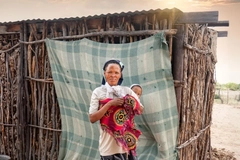African soil grows foreign profit: Closing the equity gap in beauty’s sourcing
Key takeaways
- African communities have been historically excluded from the economic value created by global trade in botanicals used for cosmetic formulations.
- The BioInnovation Africa project assists companies in navigating the rules of the Nagoya Protocol through fair and transparent benefit-sharing partnerships.
- IFRA highlights a buchu case study that brings South African Khoi-San knowledge holders into a formal benefit-sharing model.

Many global beauty companies rely on Africa’s rich biodiversity for fragrances, actives, and botanical extracts, yet the people behind these resources have historically been excluded from the economic value they help create.
The UN-backed Nagoya Protocol (NP) was established to fix this imbalance by requiring permission and benefit-sharing agreements before biological resources can be used.
However, uneven and unclear national rules have made the protocol difficult to apply, and some cosmetics companies now avoid using certain botanicals altogether due to the complex compliance.
Opting out of using certain botanicals disrupts global beauty supply chains, but also causes ecological and economic consequences for the African communities that depend on trading the resources.
“The worst case would be that natural raw materials, under the scope of NP implementing regulation, are not sourced anymore due to too much bureaucratic burden or the fear of inadvertently not being compliant with the rules in place, given they are not transparent and easy to understand. This would be detrimental to all partners in the supply chain,” the International Fragrance Association (IFRA) tells Personal Care Insights.
IFRA stresses that losing access to natural materials would undermine environmental and economic value chains in the personal care industry. The association says such an outcome would be “a huge societal failure” of the NP’s goals.
To address the sourcing compliance tension, the BioInnovation Africa project was established to facilitate more transparent collaboration between African producers and European companies under the protocol.
“The BioInnovation Africa (BIA) project is an initiative funded by the German Federal Ministry for Economic Cooperation and Development (BMZ) and implemented by GIZ (German Agency for International Cooperation),” IFRA explains.
“Its overarching goal is to strengthen sustainable and fair business partnerships between Africa and Europe based on the use of Africa’s rich biological resources.”
“The project promotes the principles of the NP on Access and Benefit-Sharing (ABS), which ensures that benefits derived from the use of genetic resources and traditional knowledge are shared equitably with the countries and communities that provide them,” the association says.
.webp) Biodiversity conservation is essential for sustaining Africa’s natural resources and the livelihoods built around them.Ensuring resources remain
Biodiversity conservation is essential for sustaining Africa’s natural resources and the livelihoods built around them.Ensuring resources remain
The NP’s rules are implemented differently across borders, creating a patchwork of national requirements. Each African partner country defines, interprets, and enforces Nagoya rules differently. This creates confusion about paperwork, timelines, and local contacts, and the delayed process can slow down or completely halt sourcing plans.
IFRA notes that the lack of clarity frequently leads to uncertainty between beauty companies and supplier countries.
“The different ways the NP has been implemented in national and regional frameworks are not always easy to implement as they might lack clarity and adequate understanding between all stakeholders involved.”
“A central element to overcome [complex frameworks] is trust and facilitating dialogue — something the BioInnovation Africa includes as a central element, and GIZ is kind of predestined to ensure.”
BioInnovation Africa aims to reduce these barriers and reinforce legal structures that simultaneously support biodiversity conservation and economic development.
“From a global perspective, we are interested in ensuring that natural raw materials, which are highly relevant for the business of our members, are traded in a fair and sustainable way, as this allows those materials to remain available in a long-term perspective,” IFRA says.
Buchu breakthrough
IFRA highlights the buchu plant, indigenous only to a small region of South Africa, as a flagship case study for the BioInnovation Africa project due to the plant’s importance across multiple sectors, including fragrance.
.webp) Buchu flowers have been used for centuries by Khoi-San healers and are now commonly-used in global beauty formulations.“Buchu, an indigenous biological resource endemic to the Western Cape region, is processed into an essential oil for use in the fragrance industry, but also into dried leaf for herbal infusions,” IFRA says.
Buchu flowers have been used for centuries by Khoi-San healers and are now commonly-used in global beauty formulations.“Buchu, an indigenous biological resource endemic to the Western Cape region, is processed into an essential oil for use in the fragrance industry, but also into dried leaf for herbal infusions,” IFRA says.
As part of the project, South Africa’s Khoi-San communities — among the country’s oldest indigenous groups — were formally involved because of their long-standing traditional knowledge of the plant.
For centuries, Khoi-San herders and hunter-gatherers have used buchu for healing, scenting, and ritual purposes. Their cultural and medicinal use of the plant made them key partners in developing a fair benefit-sharing model.
South Africa’s Department of Forestry, Fisheries, and the Environment facilitated talks between the cosmetics industry and Khoi-San representatives to resolve uncertainties around buchu sourcing.
“One [negotiation challenge] is to describe and outline the value chain, as the basis for an agreement on where to implement the benefit sharing element and in which form (monetary, non-monetary, or a combination). The other is to facilitate a trustful dialogue between the major stakeholders engaged,” IFRA explains.
The discussions led to a breakthrough when the Buchu Association, the National Khoi-San Council, and the South African San Council signed a formal ABS agreement. The final buchu agreement included both financial and non-financial benefits, making it the first agreement of its kind in South Africa.
“It employs a unique model combining both monetary and non-monetary benefit-sharing for which there is no precedent in the South African context, which can now eventually serve as a role model for dealing with comparable species,” says IFRA.
“We believe in engaging in voluntary, inclusive, and collaborative projects at a pre-competitive level, which can have a positive impact on the fragrance industry, and the society and environment at large.”













